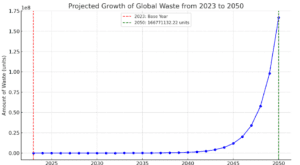Beneficial Reuse Definition and the Race to Zero Waste

Jessica Gonzalez
Global Chief Executive | Founder Happen Ventures
In the delicate dance of life and evolution, waste has played the uninvited guest, crashing the party and leaving behind a trail of destruction. The concept of Beneficial Reuse emerges as a beacon of hope in this chaotic symphony, whispering tales of a world where waste transforms into opportunity.
The recent IWMO report highlights a world drowning in over 2 billion tons of municipal waste yearly. Every discarded item underscores the pressing need for innovative environmental solutions.
Table of Contents
Unearthing the Essence: Beneficial Reuse Definition
Beneficial reuse is not merely a trend, it is a transformative approach to waste management, focusing on waste prevention and adding commodity value to unwanted items. Unlike recycling or liquidation, it elevates discarded items to assets, serving communities and reducing waste footprint.
Understanding this definition is paramount in a world teeming with waste, as it offers a glimpse into a sustainable future, where waste is not an end but a beginning.
The reality of our waste crisis is staggering. According to a 2023 World Bank report, global waste is predicted to grow by 70% by 2050 if current practices continue.

This sheer volume of unmanaged waste is a testament to our unsustainable lifestyles. In cities like Jakarta and Manila, overflowing landfills have led to severe environmental and health crises.
The data uncovers the enormity of this issue, underscoring the urgency for innovative solutions like beneficial reuse, which can turn the tide in this escalating crisis.
The Pillars of Beneficial Reuse
It’s is a multifaceted approach, a symphony of sustainability, innovation, and community empowerment. It’s crucial to recognize the core principles that drive this transformative concept:
- Innovation in Repurposing: Uncovering novel ways to breathe new life into discarded items, ensuring nothing goes to waste.
- Community Integration: Fostering synergy between local communities and businesses, creating a supportive network aimed at sustainable development.
- Environmental Stewardship: Commitment to preserving natural resources and ecosystems, emphasizing conservation and responsible use.
The Multifaceted Impact of Beneficial Reuse
The impacts of beneficial reuse extend beyond environmental conservation. It fosters social wellbeing, economic resilience, and sustainable development, with tangible benefits that resonate across communities and ecosystems.
The ripple effects of such practices are profound, influencing attitudes, behaviors, and policies, paving the way for a waste-free world.
With such profound implications, what significance does it hold in our everyday lives, and how does it reshape our perceptions of waste?
The State of Waste: A World Drowning in Refuse
The reality of our waste crisis is staggering. The sheer volumes of unmanaged waste are not just alarming but are a testament to our unsustainable lifestyles. It uncovers the enormity of this issue, underscoring the urgency for innovative solutions like beneficial reuse, which can turn the tide in this escalating crisis.
The Role of Policy & Education
Addressing the waste crisis requires not only innovative solutions but also transformative policies and awareness. Educating societies and formulating stringent regulations is the linchpin for fostering responsible waste management:
- Policy Evolution: Developing and implementing rigorous waste management policies, setting the stage for responsible and sustainable practices.
- Educational Outreach: Initiatives aimed at enlightening societies about the consequences of waste and the benefits of beneficial reuse, molding informed and responsible citizens.
Considering the gravity of the situation, how does beneficial reuse stand as a beacon of hope amid this overwhelming waste dilemma?
A Beacon for Businesses
Businesses are at the crossroads, where adopting beneficial reuse is not just an option but a necessity. A study from Stanford Business School found that companies practicing beneficial reuse saw a 10% increase in their sustainability ratings within a year.
It offers a dual advantage, economic viability and enhanced sustainability. Companies like IKEA have already started initiatives to reuse old furniture, contributing significantly to reducing waste and aiding communities.
Beneficial reuse offers cost savings, tax benefits, and better ESG scores, making it vital for businesses aiming for sustainability leadership. How does it promote a mutual relationship between businesses and communities for a sustainable ecosystem?
Aiding Communities through Conscious Contributions
Beneficial reuse is more than an environmental endeavor, it is a commitment to societal wellbeing. It manifests through meaningful community donations, enabling businesses to contribute to societal progress.
The synergy between communities and enterprises through beneficial reuse is a testament to the transformative power of conscious contributions.
Happen Ventures’ Initiative
Happen Ventures emerges as a luminary in the realm of beneficial reuse, orchestrating a harmonious dance between sustainability and community empowerment. The impact of their initiatives is palpable, echoing the transformative power of beneficial reuse:
- Community Enrichment: Donating over $650M of goods, illuminating lives and fostering community development.
- Environmental Conservation: Diverting over 60,000 tons and saving over 700,000 miles in transportation, fortifying our fight against environmental degradation.
- Sustainability Advocacy: Guiding businesses in the journey of beneficial reuse, saving costs and enhancing ESG scores, embodying the essence of sustainable enterprise.
Realizing a Circular Economy: From Concept to Action
Beneficial reuse is the linchpin in our journey from a linear to a circular economy. It is a catalyst for minimizing waste and optimizing resources, necessitating a paradigm shift in industrial and societal norms to fully realize a circular economy. It is an invitation to redefine our values, our practices, and our aspirations for a sustainable future.
The Bottom Line
Beneficial reuse transforms our view of waste from a burden to a resource. It urges individuals, businesses, and communities to join this transformative movement. It symbolizes our ability to live in harmony with nature, reshape our impact, and design a sustainable future. Now is the moment to champion reuse and lead the charge towards zero waste.










